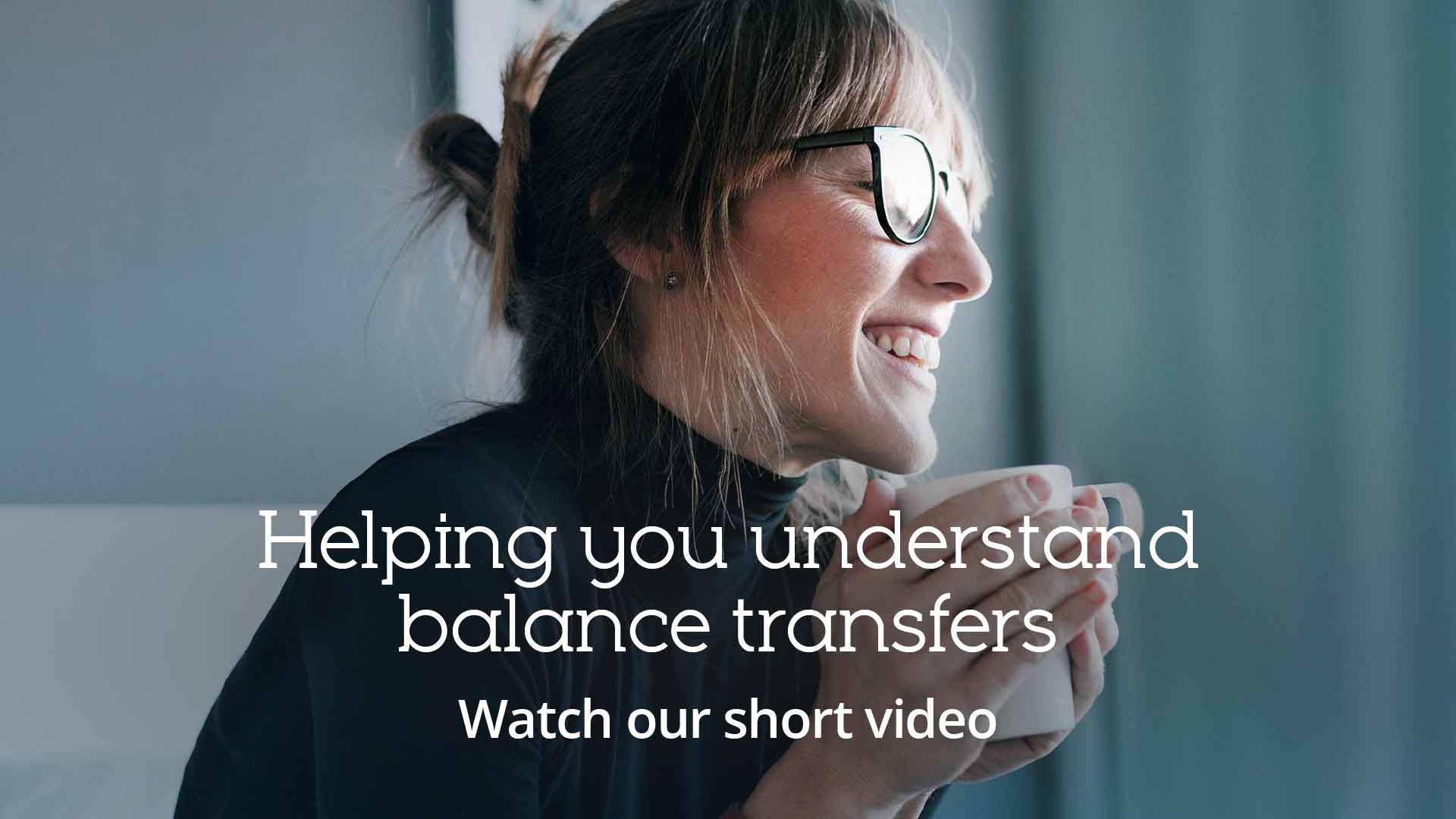
Balance transfer credit cards
Transferring existing credit card and store card balances you hold elsewhere could simplify your outgoings and make things easier to manage.
Not sure how balance transfers work?
- With a balance transfer credit card, you could combine your existing card balances, so they’ll all be in one place and you’ll just have one monthly repayment to think about.
- A balance transfer card might come in useful if you’re looking to move credit card and selected store card balances you’ve already got.
- Balance transfer cards sometimes come with an introductory rate, so when you move balances from one card to another, you’ll pay that rate until it ends.
- Balance transfer fees may apply.
Read our balance transfer guide or watch our video if you’d like things explained in more detail
-
Helping you understand balance transfers.
If you move the balances from your existing credit cards to another credit card with a different provider, you could have just one monthly payment to manage.
And if you’re currently paying quite high interest, moving your balance to a credit card with a lower interest rate could reduce your borrowing costs or give you more time to pay things off.
With a balance transfer, the minimum you can transfer to us is £100.
While the most you can transfer is 93% of your credit limit … leaving some room for any pending transactions, interest or fees.
There are two main costs of a balance transfer:
Your transfer fee … which is a percentage of the amount you’re transferring … added on to your balance when you make the transfer.
And interest
… based on your balance transfer interest rate … which you’ll pay on your balance over time until it’s cleared.
Sometimes, you’ll find a promotional offer on a credit card with interest rates as low as 0% for a set period of time.
But once that offer ends, any remaining balance or new transfers will be charged at your standard balance transfer interest rate.
At MBNA, we’ll always tell you your balance transfer fee, and interest rate, up front.
To recap, a balance transfer could help you:
manage all your borrowing in one place
reduce borrowing costs with a lower interest rate
and give you longer to repay what you owe.
So, consider your options and make sure it’s the right choice for you.
MBNA – choices made simple.
-
How long do they take?
Balance transfers normally hit your account the next working day after they’ve been approved.
How much can you transfer?
The minimum amount is £100 and there’s no limit to how many you can make. Just make sure you stay within the credit limit you’ll be given when approved for your new credit card. You’ll also need to take any balance transfer fees and other transactions into account.
What happens after the introductory rate ends?
Your interest will go to the standard rate for your credit card. This might be higher, unless you clear your balance in full before the introductory rate ends. If you pay late or miss a payment, you may have to pay fees, lose any promotional offers you have, and it could damage your credit score.
What to look out for
- The interest rate and any fees charged to your account. This is known as the Annual Percentage Rate (APR) and is useful for comparing the overall costs of credit cards.
- How long the introductory rate is for.
- Only borrow what you can afford to pay back each month.
- Make sure the credit card limit suits your needs.
- Try to pay back your full statement balance each month, so you don't have to pay any interest.
What other cards are available?
*Transfer fees may apply
To be eligible to apply, you must:
- Be a UK resident, aged 18 or over, with a regular annual income.
- Provide at least 3 years’ UK address history, an email address and phone number.
- Provide your main bank account number and sort code.
- Be free of County Court Judgements (CCJs), Individual Voluntary Agreements (IVAs) or bankruptcies.
- Not be unemployed or a student.
- Not have been declined for an MBNA credit card within the last 30 days.
We also consider things like:
- Your credit history, including previous full credit searches.
- Affordability of a new credit card based on your income.
After your Clever Check
To request a balance transfer as part of your application, you’ll need your non-MBNA credit or store card details to hand (Visa, Mastercard or American Express). You can do this later if you prefer.
Ready to see which balance transfer credit cards you’re eligible for?
To see which balance transfer credit cards you’re eligible to apply for and your estimated credit limit up front, try our eligibility checker, Clever Check.
It takes about 5 mins to complete and it won’t affect your credit score.
Features you’d expect - as standard
- Online card management - check your balance, review transactions, make payments, request transfers and lots more on your computer, phone or tablet.
- Full fraud protection - you won’t be charged for transactions you didn’t authorise, as long as you tell us if you spot anything odd, or if you lose your card.
- Choose how you pay - make repayments through your bank, using your debit card, or set up a regular Direct Debit.
- UK call centres - call us if you need to talk to us about something on your account.
- Contactless cards - make secure payments wherever you see the contactless symbol. Add your card to your phone too, to make paying even quicker.
- Paperless monthly statements - get your monthly statements delivered to your inbox instead of your letter box.
Useful information
To find out more about MBNA credit cards, and borrowing in general, read our understanding credit section.
You’ll find helpful guides on managing your credit card, transfers made easy, and in-depth information about how credit scoring works.
-
Why can’t I see a list of credit cards?
Instead of listing every credit card we offer, we’ll only show you cards you’re eligible to apply for, so you can make an informed choice about which cards will suit your needs.
Which type of credit card should I choose?
The right credit card for you depends on what you want to use it for, and on your personal circumstances. For example, if you want to combine existing card balances, then a balance transfer credit card might be useful.
We’d suggest reading through everything on this page and on our website, so you understand exactly which credit card is right for you. We also have a handy guide on choosing the right credit card.
Is a credit card the right option for me?
A credit card can help you manage your finances, but it needs to be the right choice for your needs. Other borrowing options might be more suitable depending on what you need it for.
For example, if you’re looking to build an extension on your home, a credit card might not be the right way to fund it. A loan might be more suitable as you can spread the repayments over an affordable term. However, if you need more flexibility with your monthly repayments, a credit card could suit your needs.
Learn more about whether you should choose a loan or a credit card.
Am I eligible to apply for a credit card?
To be eligible to apply for a credit card, you must:
- Be a UK resident, aged 18 or over, with a regular annual income.
- Provide at least 3 years’ UK address history, an email address, and phone number.
- Provide your main bank account number and sort code.
- Be free of County Court Judgements (CCJs), Individual Voluntary Agreements (IVAs) or bankruptcies.
- Not be unemployed or a student.
- Not have been declined for an MBNA credit card within the last 30 days.
We also consider things like your credit history, including previous full credit searches, and affordability based on your income.
Will I be credit checked when applying?
If you use Clever Check, our credit card eligibility checker , to see which cards you’re eligible to apply for then you won’t be credit checked. However, if you go ahead and complete a full application for a credit card, then we will do a credit check. This is so we can assess whether you’re likely to be able to make your repayments.
